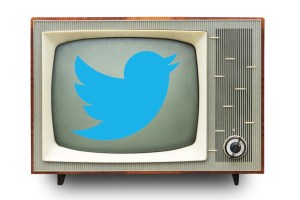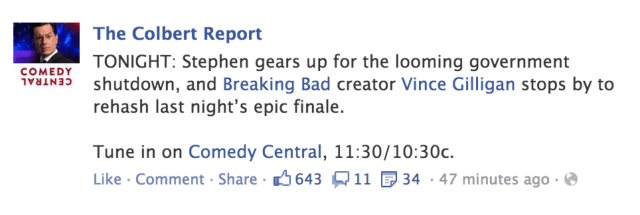On the same day that Twitter and Nielsen are debuting their first TV Ratings report emerging from the two companies’ partnership, Facebook is slyly releasing official numbers designed to give its own TV efforts a boost.
Facebook claims that AMC’s hot “Breaking Bad” finale was a hit across its social network, generating more than 5.5 million interactions from 3 million+ users. Twitter, meanwhile, saw 1.47 million tweets in comparison from 682,000+ uniques for the same show. What does this mean for Twitter, whose forthcoming IPO is heavily dependent on its TV partnerships and ad business? Is Facebook moving in for the kill?
Well, maybe. But Facebook’s numbers feel a little fudged here.
For background, Facebook announced that it will begin sending out weekly TV reports to the U.S.’s top four networks this week – a move that was not coincidentally disclosed just ahead of the Nielsen Twitter TV Rating report’s launch. Facebook says it will send data to ABC, NBC, Fox and CBS as well as a few other select partners, in order to demonstrate to what extent social conversations around TV programs are now taking place on its own network.
For example, Facebook found that ABC’s “Dancing With the Stars” generated over a million interactions across 750,000 users on its network. Previously, reports had stated that Facebook sees five times as much TV-related activity on its network than on Twitter. But as TechCrunch’s Josh Constine said before, that’s not a fair comparison.
I can’t believe Walt was a woman the whole time. Awesome ending. #BreakingBad
— Zach Braff (@zachbraff) September 30, 2013
A Like Is Not Equal To A Tweet
To state the obvious, Facebook is much bigger than Twitter: 1.15 billion monthly actives versus Twitter’s 200+ million. One could argue its numbers for almost anything will be bigger. But really, it’s Facebook’s looser definition of active engagement that makes comparing its figures to Twitter’s a problem. Facebook, you see, counts nearly any engagement with its content among its “interactions” – it includes not only those posting status updates themselves, but also others who then like, comment or re-share that post to their own networks of friends.
Facebook counting a “like” as an “interaction” is like Twitter counting a “favorite.” It’s not an ideal metric to lump in with Facebook posts or re-shares, but, rather, should be treated as a separate category of interaction.
After all, there are a number of reasons why you may like someone’s Facebook status, and it’s not always directly related to the TV content they’ve shared. You might like a post because your friend also cracked a funny joke of some sort along with their note about the show they’re watching, but that doesn’t mean you’re also a viewer or a fan. Or the post might contain more information beyond the TV show identified through basic keyword matching, and it’s the other part of the post that you’re actually “liking.”
Many social networks like to fluff their numbers when it serves a purpose. Google reports steady increases in Google+ growth, for example, making it sound like Google+ (the destination website) is a bigger player in social than it really is. In reality, Google+ numbers are growing because Google+ is being baked in as the social layer across Google products ranging from Gmail to, most recently, YouTube comments.
Facebook’s Social TV Data Could Become Better In Time
At launch, Facebook’s TV reports are not on par with Twitter’s. It will not include other data like how many people saw activity where a TV show is being discussed – something Twitter and Nielsen’s TV Rating report is already doing. And tracking this metric will be more difficult on Facebook, because its filtered News Feed doesn’t show users every post from friends.
There are also hints that Facebook has had to work quickly to overcome potentially bad data here, indicating that its move to court TV networks is more reactive than proactive in this situation. In The WSJ’s relaying of Facebook’s news, it noted that before fine-tuning its system, which relies on keywords, Facebook had problems where it reported CBS’s “NCIS” too highly because “NCIS” is a string of letters found in the more often mentioned term “San Francisco.” (To address this issue, Facebook had to create a database of characters and other keywords related to each show in order to not end up with false positives.)
That said, as Facebook ramps up its efforts in this space, its data could become more valuable in the long run because there’s more of it, and it includes profile demographics. The company has already unleashed anonymized data to select news outlets and marketers for other purposes, so there’s no reason why it couldn’t do the same for TV networks now.
Twitter Winning The Second Screen For Now
 Meanwhile, as Facebook gets up to speed with social TV data, Twitter is building out a business based on being the preferred “second screen” app. To serve up TV ratings and analysis, Twitter partnered with Nielsen, which owns SocialGuide, for TV ratings. It acquired companies like Bluefin Labs and Trendrr to further beef up its social TV efforts. With Twitter Amplify, it’s allowing broadcasters to embed short video clips in their tweets in near real-time. And it partnered with CBS on Amplify just this month. It’s also privately experimenting with a DVR-like functionality that would allow you to replay TV-related tweets as you watch a show after its original airing.
Meanwhile, as Facebook gets up to speed with social TV data, Twitter is building out a business based on being the preferred “second screen” app. To serve up TV ratings and analysis, Twitter partnered with Nielsen, which owns SocialGuide, for TV ratings. It acquired companies like Bluefin Labs and Trendrr to further beef up its social TV efforts. With Twitter Amplify, it’s allowing broadcasters to embed short video clips in their tweets in near real-time. And it partnered with CBS on Amplify just this month. It’s also privately experimenting with a DVR-like functionality that would allow you to replay TV-related tweets as you watch a show after its original airing.
In addition, Twitter rolled out TV Ad Targeting programs this summer, which let U.S. advertisers target those who just saw their TV commercials while watching a given show. Twitter has a semantic understanding of what people are talking about here, too. Most importantly, being pushed the ad twice seems to work well, according to early reports. Nielsen found that the combination of TV ad and follow-up tweet delivered 95 percent stronger message association and 58 percent higher purchase intent than TV ads alone.
With all these initiatives underway, Twitter, though smaller and less diverse (the site sees a disproportionate number of young female users CBS’s chief researcher officer told The WSJ), is for now ahead of Facebook in terms of making a business out of the social TV data it has on hand.

